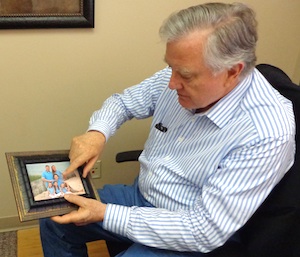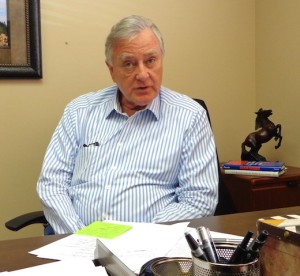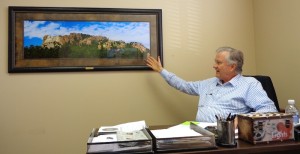An Exclusive Madville Times Interview
Somewhere in my piles of stuff is a photo of Senator Larry Pressler with me and a nice girl from Vermillion, Angeline Wilson, at the U.S. Capitol on a muggy June day 25 years ago.

On this muggy Saturday in Sioux Falls, as candidate Pressler and I discussed policy and politics at his Sioux Falls office, I mentioned that brief meeting, one of thousands the Senator politely hosted during his time in Washington. Pressler said recollections like that are one of the small joys of his campaign. As he tours the state, people come up to shake his hand and say they're glad he's running again (though Pressler himself muses that maybe those folks are just being kind to an old man). And often they'll show him a picture from back in the day of Mom, Dad, and the kids (now with grandkids) with Pressler in D.C. or the State Fair or some such remarkable moment in their families' lives.
Ah, nostalgia. It's like Styx coming back and riffing out "Mr. Roboto" on the casino circuit. But will we elect Dennis DeYoung to the Senate?
You wouldn't think so, when Pressler has maybe a hundredth of the money of his main-party opponents. Pressler admits that, as a rule, "Money is determinative" of electoral success. "We"—and he looks around the office at his wife Harriet, his one paid staffer, and a friend-volunteer—"will be the exception."
Pressler's run at age 72, 16 years after losing his seat to the now retiring Tim Johnson, is not a return from retirement. Pressler has been teaching and serving on boards ever since leaving the Senate. He says he will always work. But he'd like to give South Dakota six more years of his work.
Pressler's Legacy: The Telecommunications Act
Pressler runs on the record of what he achieved for South Dakota. He refers to the Telecommunications Act of 1996 as his "magnum opus," a project that consumed his efforts for ten years. That law created the Universal Service Fund, a tax that he had to rename a fee to get past the Gingrich Congress (sound familiar?). Pressler notes that Tim Johnson was one of only 16 votes against that fee and the final form of the bill in the House. Johnson may have had his reasons, but Pressler says the Universal Service Fund subsidized installation of fiber-optic cable across the country.

Basically, says Pressler, the USF allowed us to have Internet and cell phone service almost everywhere in South Dakota, not just Sioux Falls and Rapid City. The Telecommunications Act made long-distance calls an ancient artifact, made phone calls cheaper than they were in the 1950s, and stimulated the economy by bringing almost everyone, including rural folks, access to the newest communications technologies.
Pressler says he wanted the Telecommunications Act to include cable TV regulations that would have given customers à la carte channel selection, pricing controls, and a 15% cap on ad time. But Pressler says that after attending a cable industry convention in Las Vegas, President Bill Clinton sent VP Al Gore to the Senate to kill those regulations.
Pressler would like the chance to revisit those regulations and restore the public service requirements for broadcasters. However, Pressler would place more priority on enforcing existing anti-trust laws to keep media companies from consolidating and monopolizing. Calling himself a "Teddy Roosevelt trust-busting conservative," Pressler says Time-Warner and Comcast are too big and that we need more competition in the media. He says the big media companies got a break by getting Congress to move anti-trust enforcement on their industry from the Department of Justice, which knows anti-trust law, to the Federal Communications Commission, which finds anti-trust law somewhat out of its ken.
Deficit and Taxes
Larry Pressler will raise your taxes. He said at Dakotafest that he would cut corporate, personal, and charitable tax deductions. In our interview, he said he would vote to increase the gasoline tax to replenish the Highway Trust Fund. He says Congress's temporary fix is irresponsible, since it adds to the deficit. Pressler sees great danger in the deficit and says we must get serious about fixing it.
Military and Foreign Policy
Pressler is the only candidate for South Dakota's open Senate seat who served in the military (U.S. Army, Vietnam, two tours, 1966–1968). The veteran is not eager to give today's young men and women the same experience. When it comes to foreign military intervention, Pressler labels himself a "Ron Paul Libertarian": he would send troops overseas only to secure "substantial American foreign policy interests."
I asked if that standard justifies intervention in the Islamic State's slaughter of the polytheist Yazidis in Iraq. Pressler said it may, depending on information that the President may have, but where there is doubt, he would err on the side of non-intervention.
Pressler worries that President Obama has erred in the other direction with his use of force in Iraq this month. He notes that he voted for Obama in 2008 for conservative reasons, expecting Obama to entangle us in fewer wars than John McCain. Pressler says McCain would have maintained permanent U.S. military presences in Iraq and Afghanistan and sent troops to Syria.
Pressler regularly cites the example of a U.S. fort that he and his wife visiting in northern Italy. Far from repelling the Slovenian menace, that base serves mostly to stimulate the local economy. If the military must be a jobs program, Pressler would prefer to bring those jobs home and boost the economy here. But "the whole economy has been taken over by the military-industrial state," says Pressler, and he would like to restore our military focus to military objectives, not big money.
Defining Independence
Pressler holds out his own Senate candidacy as a jobs program for young pols across South Dakota. He vows to serve just one more term, meaning that a whole crop of aspiring candidates will be able to rev their campaign engines in 2020. I ask if there's any chance he could be re-seduced by the power and celebrity of D.C. life. Pressler says absolutely not: he's been there, done that, and won't get stuck. One term—Pressler means it.

That one-term promise is crucial to his expectation of what he regularly refers to as "the glorious freedom of independence." He says Senators and Congresspeople of both parties have to spend more than half of their time in Washington raising money. They aren't just filling their coffers for their own reëlections; the party leaders set quotas on contributions to colleagues' campaigns as conditions for plum committee appointments.
Pressler says nuts to that. While John Thune runs across the street each day to beg for money, Pressler says he will be working full-time for South Dakota. Even if he did reach for cash, Pressler knows he'd come up short, since the special interest groups don't stand to gain from candidates who free themselves of partisan and reëlection pressures. Ah, independence!
Blogospheric Curiosity
Say, remember that Internet that Pressler's Telecommunications Act helped bring to everybody? (Harriet jokes that she thought Larry, not Al Gore, invented the Internet.) Candidate Pressler shows a marked curiosity about the Web he hath wrought. He spent a few minutes at the beginning of our interview grilling me about the South Dakota blogosphere and the journalistic quality of its various nodes, including my own. I wouldn't say Pressler is taking his cues from the blogs, but he is paying attention to them.
Pressler's curiosity about our homegrown use of the Internet stands in marked contrast to his opponent Mike Rounds, the former governor who leaves all that Web stuff to his lackeys. Rounds's techno-aloofness makes him a little less qualified to legislate amidst the ongoing technological revolution than the ever-curious Pressler, who gave that revolution an early boost.

He's running 18 years after losing his seat to Tim Johnson, and 40 years after being elected to the house. It will be remarkable if he can make a comeback after that much time out of office.
The 1996 Telecommunications Act almost destroyed local radio, and opened the door for syndication to sweep the country. Companies that had been allowed to own only 2 stations in any market, and 7 stations (I think) in total could now own as many as they wish. They now could own every station in any given market and literally hundreds across the country. They soon learned it was cheaper to stop paying local talent and simply sign up to air Rush Limbaugh and others. This meant local staffs were slashed, including news departments.
In addition, the "equal time" and public service requirements also went away. Radio stations were no longer serving their communities. They were simply another commodity generating cash for large corporate headquarters in other states. Thankfully we are seeing a bit of a swing back to more local control and ownership, but Larry Pressler's bill ripped the heart out of an entire industry. That bill took away broadcasting and introduced what I call narrowcasting.
There you go Mike Henriksen with those pesky facts again. Hell, we cannot remember what we had for lunch yesterday and you bring up stuff from 1996 that is more relevant today that it obviously was then. There are no news outlets for news in America, it is all bullshit that you hear and see now with no real reporting. South Dakota is run by a one party system that has the broadcasters and publishers in their pocket by their junk. Democracy failed when Pressler put his plan into action and it is his fault and the fault of those that voted for this damnation of where we are today. His system is a propaganda system that works in the business of disinformation. The only thing that I see that has any semblance to news are blogs and you have to be careful on those to make sure of the honesty and integrity of the sources. Here is one of the very best in the country and we are all very fortunate to have it. Thanks a million for your work Cory, readers like myself, appreciate your efforts.
Mike those professionals at the local radio stations we lost were like legends in our local communities. They really were professionals and those stations were part of the heart of a community and now it's all stale syndication. What a loss!
My memory of Larry Pressler was that he was ineffective and not taken seriously by the media and his Senate colleagues though he sure had the senior citizens wrapped around his finger which made it hard to defeat him. Tom Daschle did far more in helping the communities of South Dakota at the time.
While in college I briefly looked into interning at Senator Daschle's office in Washington DC but it was full. Senator Pressler's office had openings and they were very interested but I just couldn't do it.
I'd love to take college classes that former Senator Pressler taught since he could be a tremendous resource on a University campus but not have him be our next Senator.
I hope I can say this accurately, and if I don't please correct me, but it's also my understanding that the 1996 Telcom act failed to properly anticipate the nature of the internet (i.e. that it is a public utility) and in so doing failed to make infrastructure sharing mandatory–the net result being that we in the US have significantly inferior internet service than do other first world countries.
Not sure what the fix would be at this point. Any suggestions?
The first chink in the armor of this atrocity of a bill was that net neutrality is still being debated and we have a chance at killing the big boys from taking this from us. There is also support from the White House on keeping our internet system open and available for all. Ideally, we the people need to revisit Presslers boondoggle to eliminate it completely as it is a failure. Alas, this will not be as it is ingrained now in our corrupt system of controlled media.
You are correct in that the US has one of the most antiquated, slow systems of internet connections in the western world. In short, our system sucks compared to Europe for example. In our system, the big boys that control the financial world and communications world, get their information just a little quicker than the rest of the system so you can bet they are manipulating Wall Street for their own greedy little pockets. Our system will not improve because there is to much corrupted money going into bankers pockets to change unless we pay attention with our votes. One of the greatest gift we South Dakotans gave the rest of the country was electing Tom Daschle and sending Larry Pressler back to doing whatever it is he does here or wherever. Also, in Europe, theirs is also much more affordable than ours, damn those Frenchies and the rest of "old Europe" for their efficiency.
If you or any of the rest of the good folks that read this blog have not signed on to keep net neutrality, you are cutting your own throats by taking the confirmed route of eliminating blogs like this one. If you do not know what net neutrality is, here is a petition that you can do some research on before signing to show your support. http://www.change.org/p/tom-wheeler-save-net-neutrality
Pressler is the best candidate Dick Wadhams, Mitch McConnell and SDGOP could have possibly purchased: brilliant, really.
Hahaha! Jerry, it sounds like you may have heard me on the air a time or two! If so, thank you very much for listening!